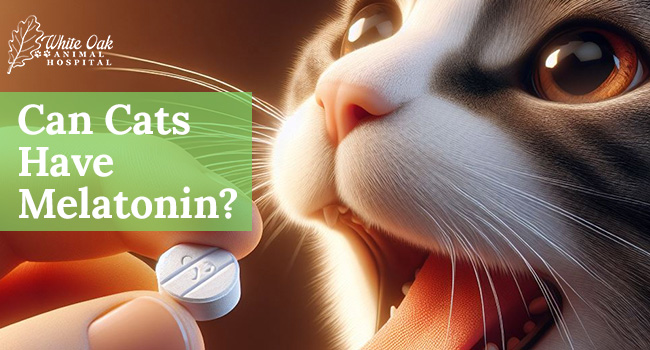
Can cats have melatonin? Understanding the potential benefits and considerations of administering melatonin to our feline companions requires a foundational grasp of the hormone’s role in the body. Melatonin, a naturally occurring substance housed within the pineal gland of humans and animals, is a pivotal regulator of sleep cycles. Its production typically surges in response to diminishing light, acting as a biological signal for the body to transition into a state conducive to rest and rejuvenation.
This natural process prompts various physiological changes, preparing the body for sleep onset. However, in certain circumstances, such as disruptions in the body’s internal clock or environmental stressors, this delicate balance may falter, leading to sleep disturbances or irregularities. Within this context, the potential role of melatonin supplementation for cats comes into focus, offering a means to support and optimize their sleep-wake cycles.
Can cats have melatonin?
Understanding this fundamental mechanism sheds light on the potential benefits of melatonin supplementation for cats, particularly in addressing sleep-related issues and promoting overall well-being. By comprehending the workings of melatonin within feline physiology, pet owners can navigate its potential applications with informed awareness, seeking to optimize the health and comfort of their cherished companions.
Exploring the Benefits of Melatonin for Cats
Regulation of Sleep Patterns
Alleviation of Anxiety or Stress
Another notable benefit of melatonin for cats is its potential to alleviate anxiety or stress. Like humans, cats can experience unease or tension moments, particularly in unfamiliar or stressful situations. Pet owners may help mitigate these feelings by introducing melatonin supplements, promoting a sense of calmness and tranquility in their feline companions. This aspect highlights the multifaceted nature of melatonin’s effects, extending beyond sleep regulation to encompass emotional well-being. Can cats have melatonin? Understanding its potential to soothe anxiety or stress may offer valuable insights for pet owners seeking to enhance their cats’ quality of life.
Management of Seasonal Changes
Support for Aging Cats
Potential Risks and Side Effects
Furthermore, there is a risk of overdosing if the supplement is not administered according to recommended guidelines. Pet owners must exercise caution and consult a veterinarian before introducing any new supplement into their cat’s routine.
By remaining vigilant and informed, pet owners can minimize the likelihood of adverse reactions and ensure the safety and well-being of their cherished feline companions amidst their exploration of melatonin supplementation. Can cats have melatonin? Understanding the potential risks is paramount in making informed decisions regarding its use for feline health.
Safety Tips for Cat Owners Considering Melatonin
Consult with a Veterinarian First
Start with Low Dosages
Monitor for Any Adverse Reactions
When considering the question, “Can cats have melatonin?” it’s crucial to prioritize vigilant monitoring for any signs of adverse reactions when administering this supplement to your feline companion. Common adverse effects may manifest as drowsiness, gastrointestinal upset, or alterations in mood or behavior. Therefore, observing your cat closely after administering melatonin and promptly reporting any concerning symptoms to your veterinarian is imperative. By remaining attentive to your cat’s well-being and swiftly addressing any issues that arise, you can ensure timely intervention and minimize the impact of potential adverse reactions.
Keep Melatonin Supplements Out of Reach
To prevent accidental ingestion or misuse, storing melatonin supplements securely and out of reach of your cat is imperative. Ensure the packaging is sealed tightly and stored in a location inaccessible to curious paws. By exercising caution and diligence in storing melatonin supplements, you can mitigate the risk of unintended exposure and maintain a safe environment for your cat. Can cats have melatonin? While it may benefit cats in certain circumstances, pet owners must approach supplementation with diligence and informed awareness.
At White Oak Animal Hospital, pet owners can access integrative options unavailable elsewhere, with telemedicine consultations in traditional Chinese veterinary medicine (TCVM) and over 28 years of veterinary experience. For those seeking guidance or assistance, White Oak Animal Hospital stands ready to provide expert care and support tailored to your cat’s individual needs.
Frequently Asked Questions
Can cats have melatonin to help with travel anxiety?
Yes, melatonin supplements can be beneficial for cats experiencing travel anxiety. It may help calm their nerves and make the journey more comfortable. However, it’s essential to consult a veterinarian for proper dosage and administration.
Is melatonin safe for kittens?
While melatonin is generally safe for adult cats, its use in kittens should be cautiously approached. Kittens have developing systems, and dosage adjustments may be necessary. Consultation with a veterinarian is recommended before administering melatonin to kittens.
Can melatonin help with my cat’s hairballs?